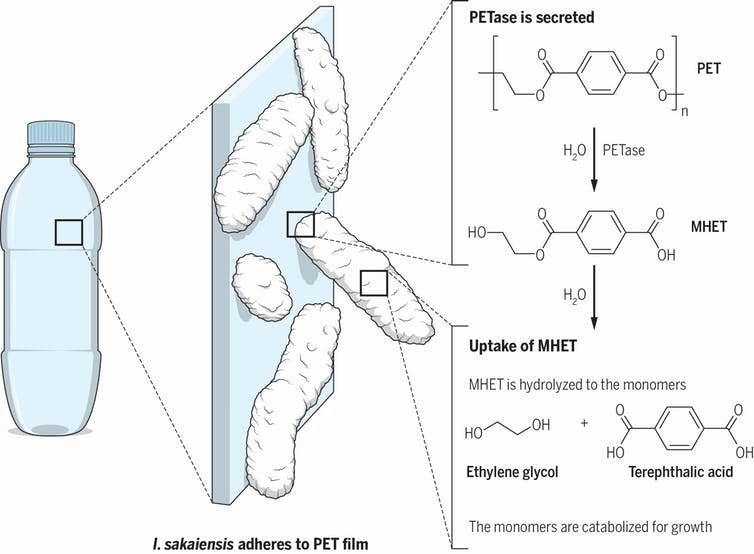New Plastic-munching Bacteria Could Fuel a Recycling Revolution
Published on by Water Network Research, Official research team of The Water Network in Science
A team at Kyoto University have, by rummaging around in piles of waste, found a plastic munching microbe.
After five years of searching through 250 samples, they isolated a bacteria that could live on poly(ethylene terephthalate) (PET), a common plastic used in bottles and clothing. They named the new species of bacteria Ideonella sakaiensis.
You may think this is the rerun of an old story, as plastic-eating microbes have already been touted as saviours of the planet. But there are several important differences here. First, previous reports were of tricky-to-cultivate fungi, where in this case the microbe is easily grown. The researchers more or less left the PET in a warm jar with the bacterial culture and some other nutrients, and a few weeks later all the plastic was gone.

Bottle breakdown. Illustration: P. Huey. Reprinted with permission from U.T. Bornscheuer, Science 351:1154 (2016).
Second - and the real innovation - is that the team have identified the enzymes that Ideonella sakaiensis uses to breakdown the PET. All living things contain enzymes that they use to speed up necessary chemical reactions. Some enzymes help digest our food, dismantling it into useful building blocks. Without the necessary enzymes the body can’t access certain sources of food.
For example, people who are lactose intolerant don’t have the enzyme that breaks down the lactose sugar found in dairy produce. And no human can digest cellulose, while some microbes can. Ideonella sakaiensis seems to have evolved an efficient enzyme that the bacteria produces when it is in an environment that is rich in PET.
The Kyoto researchers identified the gene in the bacteria’s DNA that is responsible for the PET-digesting enzyme. They then were able to manufacture more of the enzyme and then demonstrate that PET could be broken down with the enzyme alone.
First real recycling
This opens a whole new approach to plastic recycling and decontamination. At present, most plastic bottles are not truly recycled. Instead they are melted and reformed into other hard plastic products. Packaging companies typically prefer freshly made “virgin” plastics that are created from chemical starting materials that are usually derived from oil.
The PET-digesting enzymes offer a way to truly recycle plastic. They could be added to vats of waste, breaking all the bottles or other plastic items down into into easy-to-handle chemicals. These could then be used to make fresh plastics, producing a true recycling system.
Manufactured enzymes are already used to great effect in a wide range of everyday items. Biological washing powders contain enzymes that digest fatty stains. The enzymes known as rennet that are used to harden cheese once came from calfs’ intestines but are now manufactured using genetically engineered bacteria. Maybe we can now use a similar manufacturing method to clean up our mess.
Source: The Conversation
Media
Taxonomy
- Polymers & Plastics
- plastic pollution
- plastic debris
- microplastics